名词性从句翻译
名词性从句翻译1
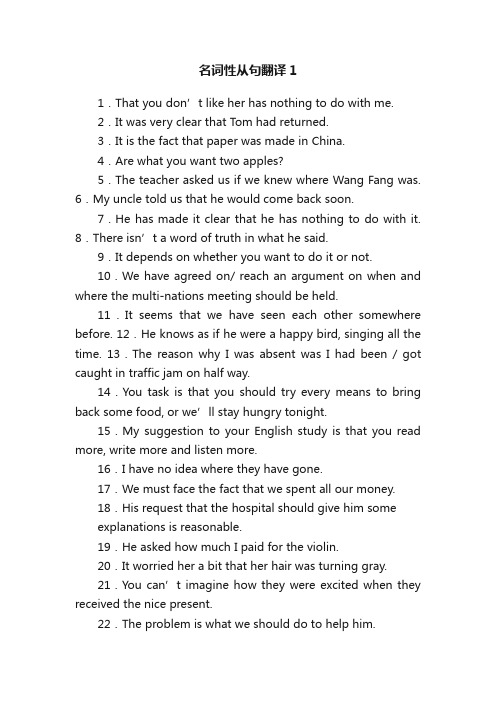
名词性从句翻译11.That you don’t like her has nothing to do with me.2.It was very clear that Tom had returned.3.It is the fact that paper was made in China.4.Are what you want two apples?5.The teacher asked us if we knew where Wang Fang was. 6.My uncle told us that he would come back soon.7.He has made it clear that he has nothing to do with it. 8.There isn’t a word of truth in what he said.9.It depends on whether you want to do it or not.10.We have agreed on/ reach an argument on when and where the multi-nations meeting should be held.11.It seems that we have seen each other somewhere before. 12.He knows as if he were a happy bird, singing all the time. 13.The reason why I was absent was I had been / got caught in traffic jam on half way.14.You task is that you should try every means to bring back some food, or we’ll stay hungry tonight.15.My suggestion to your English study is that you read more, write more and listen more.16.I have no idea where they have gone.17.We must face the fact that we spent all our money.18.His request that the hospital should give him someexplanations is reasonable.19.He asked how much I paid for the violin.20.It worried her a bit that her hair was turning gray.21.You can’t imagine how they were excited when they received the nice present.22.The problem is what we should do to help him.23.Do you agree to the plan that we have a trip the day after tomorrow.24.When and how he goes home is his own decision. 25.Which team will win is uncertain.26.Three days later, we heard the word our country had sent up another man-made satellite.27.Whoever fails to see this will make a big mistake.28.It makes no difference whether our sports meeting will be held this week or next week.29.What we are doing now has never been done before. 30.Can you tell me whom the dictionary belongs to?1.你不喜欢他与我无关.2.汤姆已经回来了这很清楚.3.只是中国首先造出来的这是事实.4.你要的是两个苹果吗?5.老是问我们是否知道王芳在哪里.6.我叔叔说他很快就会回来.7.我已经说清楚了他与这件事无关.8.他说的话没有一句是真的.9.这取决于你是否想做这件事.10.他们就何时何地举行这次多国会议达成了一致意见.11.我们以前似乎在哪儿见过.12.他看起来像只快乐的小鸟,总在唱歌.13.我为什么迟到的原因是我在半路上遇到塞车了.14.你们的任务是在六点钟以前想尽一切办法找些吃的回来,否则,今晚我们就得挨饿.15.我对你们学英语的建议就是多读,多听,多写.16.我不知道他们去了哪里.17.我们必须面对这个事实即我们已经花光了所有的钱.18.他要医院给他作出解释的要求是合理的.19.他问我买小提琴花了多少钱.20.她的头发变白了使他有点担心.21.你想象不到他们在收到这份精美的礼物时有多么激动.22.问题是我们应该做什么来帮助他.23.你同意我们后天去旅行的计划吗?24.什么时候,怎样回家那是他自己的决定.25.哪支球队来取胜还不一定.26.三天后,我们听到了这样的消息我国又发射一颗人造卫星.27.任何对此事视而不见的人将会铸成大错.28.运动会这个星期或者下星期开都没有关系.29.我们现在做的以前从来没有做过.30.你能告诉我这本字典是属于谁的吗?。
名词性从句的翻译
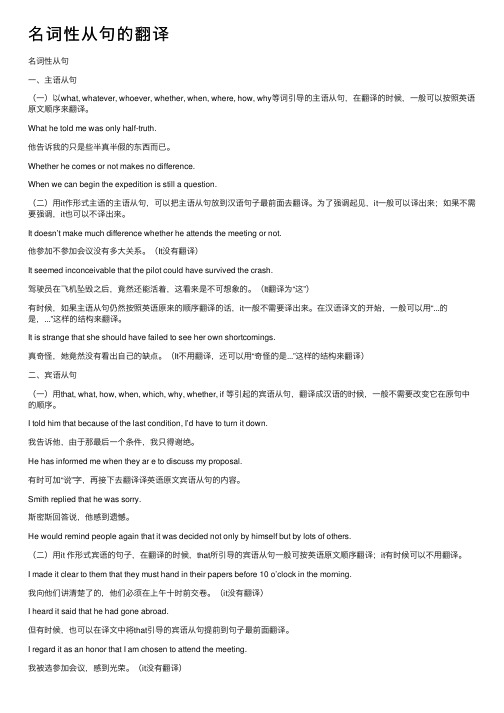
名词性从句的翻译名词性从句⼀、主语从句(⼀)以what, whatever, whoever, whether, when, where, how, why等词引导的主语从句,在翻译的时候,⼀般可以按照英语原⽂顺序来翻译。
What he told me was only half-truth.他告诉我的只是些半真半假的东西⽽已。
Whether he comes or not makes no difference.When we can begin the expedition is still a question.(⼆)⽤it作形式主语的主语从句,可以把主语从句放到汉语句⼦最前⾯去翻译。
为了强调起见,it⼀般可以译出来;如果不需要强调,it也可以不译出来。
It doesn’t make much difference whether he attends the meeting or not.他参加不参加会议没有多⼤关系。
(It没有翻译)It seemed inconceivable that the pilot could have survived the crash.驾驶员在飞机坠毁之后,竟然还能活着,这看来是不可想象的。
(It翻译为“这”)有时候,如果主语从句仍然按照英语原来的顺序翻译的话,it⼀般不需要译出来。
在汉语译⽂的开始,⼀般可以⽤“...的是,...”这样的结构来翻译。
It is strange that she should have failed to see her own shortcomings.真奇怪,她竟然没有看出⾃⼰的缺点。
(It不⽤翻译,还可以⽤“奇怪的是...”这样的结构来翻译)⼆、宾语从句(⼀)⽤that, what, how, when, which, why, whether, if 等引起的宾语从句,翻译成汉语的时候,⼀般不需要改变它在原句中的顺序。
名词性从句翻译
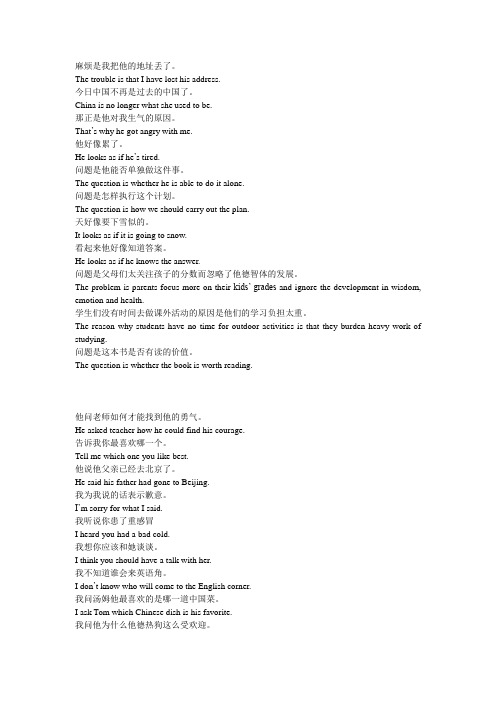
麻烦是我把他的地址丢了。
The trouble is that I have lost his address.今日中国不再是过去的中国了。
China is no longer what she used to be.那正是他对我生气的原因。
That’s why he got angry with me.他好像累了。
He looks as if he’s tired.问题是他能否单独做这件事。
The question is whether he is able to do it alone.问题是怎样执行这个计划。
The question is how we should carry out the plan.天好像要下雪似的。
It looks as if it is going to snow.看起来他好像知道答案。
He looks as if he knows the answer.问题是父母们太关注孩子的分数而忽略了他德智体的发展。
The problem is parents focus more on their kids’ grades and ignore the development in wisdom, emotion and health.学生们没有时间去做课外活动的原因是他们的学习负担太重。
The reason why students have no time for outdoor activities is that they burden heavy work of studying.问题是这本书是否有读的价值。
The question is whether the book is worth reading.他问老师如何才能找到他的勇气。
He asked teacher how he could find his courage.告诉我你最喜欢哪一个。
Tell me which one you like best.他说他父亲已经去北京了。
名词性从句汉译英
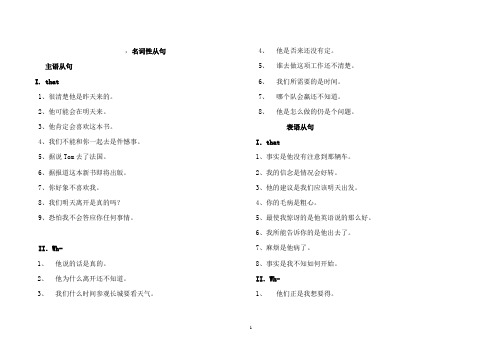
,名词性从句主语从句I. that1、很清楚他是昨天来的。
2、他可能会在明天来。
3、他肯定会喜欢这本书。
4、我们不能和你一起去是件憾事。
5、据说Tom去了法国。
6、据报道这本新书即将出版。
7、你好象不喜欢我。
8、我们明天离开是真的吗?9、恐怕我不会答应你任何事情。
II.Wh-1、他说的话是真的。
2、他为什么离开还不知道。
3、我们什么时间参观长城要看天气。
4、他是否来还没有定。
5、谁去做这项工作还不清楚。
6、我们所需要的是时间。
7、哪个队会赢还不知道。
8、他是怎么做的仍是个问题。
表语从句I.that1、事实是他没有注意到那辆车。
2、我的信念是情况会好转。
3、他的建议是我们应该明天出发。
4、你的毛病是粗心。
5、最使我惊讶的是他英语说的那么好。
6、我所能告诉你的是他出去了。
7、麻烦是他病了。
8、事实是我不知如何开始。
II.Wh-1、他们正是我想要得。
2、问题是它是否值得一做。
3、问提是我们该作些什么来帮助他。
4、问题是谁留下。
5、那就是他出生的地方。
6、我们就是这样分手的。
7、我是你正在找的那个人。
8、这就是我去那的原因同位语从句I.that1、我听到了我们队获胜的消息。
2、他在会上什么都没说的事实使我们惊讶。
3、他打算来的消息使我们高兴。
4、他已经下定学好英语的决心。
5、他当选的消息不是真的。
II.Wh-1、我不知道他什么时候来。
2、你不知道我多么着急。
3、很难回答你提出的我是如何做的问题。
4、我提出的如何邀请他的问题已经得到了解决。
5、你为什么对音乐感兴趣的问题还没回答。
宾语从句I. That clause1,我认为他们学习很努力。
2,他说他将在11日动身。
3,他告诉我医生马上就来。
4,他说他妈妈在读书。
5,他说他的爸爸生于1948年。
6,我恐怕犯了一个错误。
7,我们有把握成功。
8,对不起我错拿了你的钢笔。
II.Whether/ if1,我想知道他明天是否来。
2,我想知道你是否愿意和我一起去看足球赛。
英语八大从句类型例句
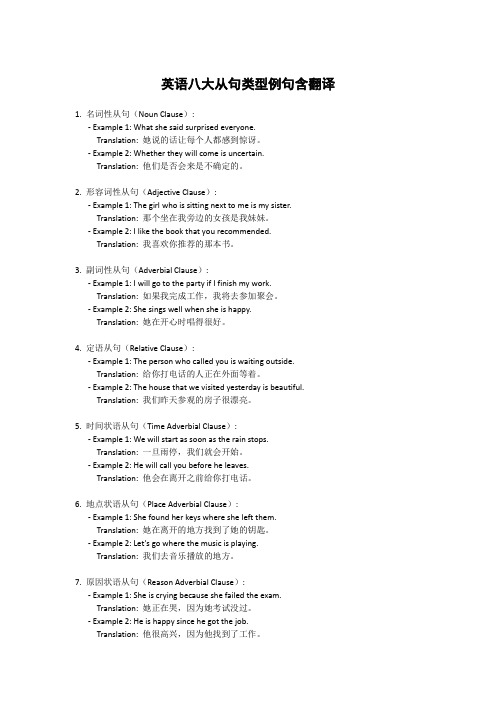
英语八大从句类型例句含翻译1. 名词性从句(Noun Clause):- Example 1: What she said surprised everyone.Translation: 她说的话让每个人都感到惊讶。
- Example 2: Whether they will come is uncertain.Translation: 他们是否会来是不确定的。
2. 形容词性从句(Adjective Clause):- Example 1: The girl who is sitting next to me is my sister.Translation: 那个坐在我旁边的女孩是我妹妹。
- Example 2: I like the book that you recommended.Translation: 我喜欢你推荐的那本书。
3. 副词性从句(Adverbial Clause):- Example 1: I will go to the party if I finish my work.Translation: 如果我完成工作,我将去参加聚会。
- Example 2: She sings well when she is happy.Translation: 她在开心时唱得很好。
4. 定语从句(Relative Clause):- Example 1: The person who called you is waiting outside.Translation: 给你打电话的人正在外面等着。
- Example 2: The house that we visited yesterday is beautiful.Translation: 我们昨天参观的房子很漂亮。
5. 时间状语从句(Time Adverbial Clause):- Example 1: We will start as soon as the rain stops.Translation: 一旦雨停,我们就会开始。
名词性从句翻译
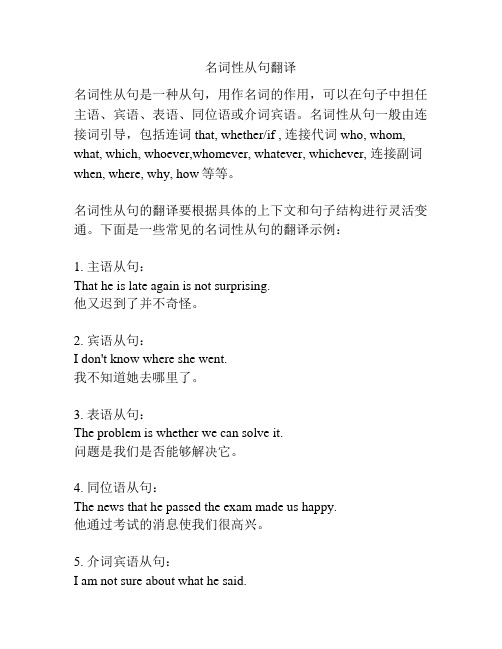
名词性从句翻译名词性从句是一种从句,用作名词的作用,可以在句子中担任主语、宾语、表语、同位语或介词宾语。
名词性从句一般由连接词引导,包括连词that, whether/if , 连接代词who, whom, what, which, whoever,whomever, whatever, whichever, 连接副词when, where, why, how等等。
名词性从句的翻译要根据具体的上下文和句子结构进行灵活变通。
下面是一些常见的名词性从句的翻译示例:1. 主语从句:That he is late again is not surprising.他又迟到了并不奇怪。
2. 宾语从句:I don't know where she went.我不知道她去哪里了。
3. 表语从句:The problem is whether we can solve it.问题是我们是否能够解决它。
4. 同位语从句:The news that he passed the exam made us happy.他通过考试的消息使我们很高兴。
5. 介词宾语从句:I am not sure about what he said.我不确定他说的是什么。
6. 间接引导名词性从句:He asked where I lived.他问我住在哪里。
7. 是否从句:I wonder whether/if she will come to the party.我想知道她是否会来参加派对。
8. 选择性从句:He asked me whether I preferred coffee or tea.他问我是喜欢咖啡还是茶。
9. 宾语从句(陈述句变为疑问句):Do you know what time it is?你知道现在几点钟吗?10. 宾语从句(连接代词):I wonder who is going to pick us up at the airport.我想知道谁会在机场接我们。
课件10 名词性从句的翻译

3) 加入冒号、破折号和 “这样”、“这一”、“即”等字眼
But
considering realistically, we had to face the fact that our prospects were less than good. 但在实事求是地考虑一番之后,我们不得不正 视这样一个事实:我们的前景并不妙。 Influenced by these ethics, the new generation live under the delusion that money does not stink. 受这种道德观念的影响,青年一代生活在这样 一种错觉中,以为金钱总是香喷喷的。
Most
remarkable of all is the fact that each question was decidedly consensus, thus enhancing prospects that the treaty will win approval when it comes up for ratification.
7
宾语从句
以that,
what, how引导的 宾语从句 句
以it作形式宾语的宾语从
1) 以that, what, how引导的宾语从句
一般按原句顺序翻译
I
told him that I had to turn him down. 我告诉他我不得不拒绝他。 Did you hear what I said? 你没听见我的话吗? I told him how appealing I found the offer. 我告诉他,这个机会对我有着多么大的吸引 力。
2) 译为类似定语的结构或独立句
什么是名词性从句
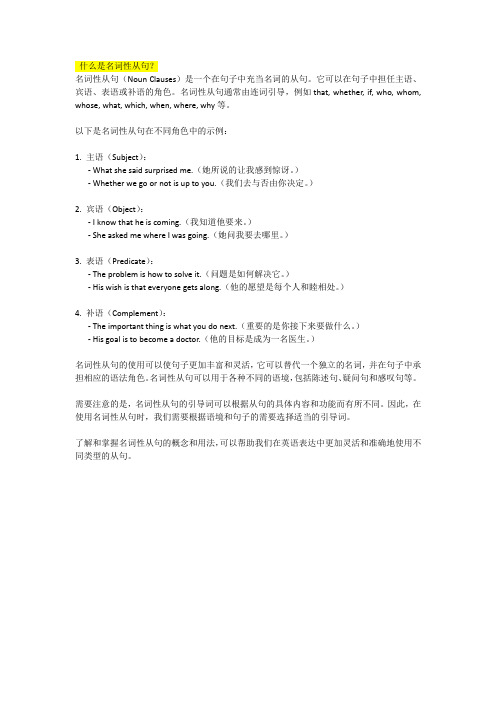
什么是名词性从句?名词性从句(Noun Clauses)是一个在句子中充当名词的从句。
它可以在句子中担任主语、宾语、表语或补语的角色。
名词性从句通常由连词引导,例如that, whether, if, who, whom, whose, what, which, when, where, why等。
以下是名词性从句在不同角色中的示例:1. 主语(Subject):- What she said surprised me.(她所说的让我感到惊讶。
)- Whether we go or not is up to you.(我们去与否由你决定。
)2. 宾语(Object):- I know that he is coming.(我知道他要来。
)- She asked me where I was going.(她问我要去哪里。
)3. 表语(Predicate):- The problem is how to solve it.(问题是如何解决它。
)- His wish is that everyone gets along.(他的愿望是每个人和睦相处。
)4. 补语(Complement):- The important thing is what you do next.(重要的是你接下来要做什么。
)- His goal is to become a doctor.(他的目标是成为一名医生。
)名词性从句的使用可以使句子更加丰富和灵活,它可以替代一个独立的名词,并在句子中承担相应的语法角色。
名词性从句可以用于各种不同的语境,包括陈述句、疑问句和感叹句等。
需要注意的是,名词性从句的引导词可以根据从句的具体内容和功能而有所不同。
因此,在使用名词性从句时,我们需要根据语境和句子的需要选择适当的引导词。
了解和掌握名词性从句的概念和用法,可以帮助我们在英语表达中更加灵活和准确地使用不同类型的从句。
名词性从句的译法
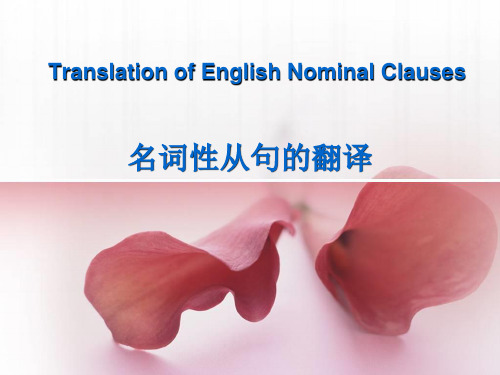
例4:Whatever he saw and heard on his trip gave him a very deep impression. 【译文】他此行所见所闻都给他留下了深刻的印象。 例5:Since hearing her predicament, I’ve always arranged to meet people where they or I can be reached in case of delay. 【译文】听她说了那次尴尬的经历之后,每每与人约 见,我总要安排在彼此能够互相联系的上的地 方,以免误约。
从句)
【译文】物质是由粒子组成的,这些粒子在一些物 态中要比在另一些物态中更易于运动。 根据上 述理论,我们可以简要地阐明固体、液体和气 体之间的主要差别。
补充例句:名词性从句 例7.It is flattering to believe that they (ideas) are too profound to be expressed so clearly that all who run may read, and very naturally it does not occur to such writers that the fault is with their own minds which have not the faculty of precise reflection. 【译文】认为自己的思想深奥,不可能表达得很清 楚,让任何人都能理解,这是一种虚荣的念头。 这样的作家当然不会想到,问题还是出在自己 脑子缺乏精确思考的能力。来自2 名词性从句译成定语从句
名词性从句英译汉例句
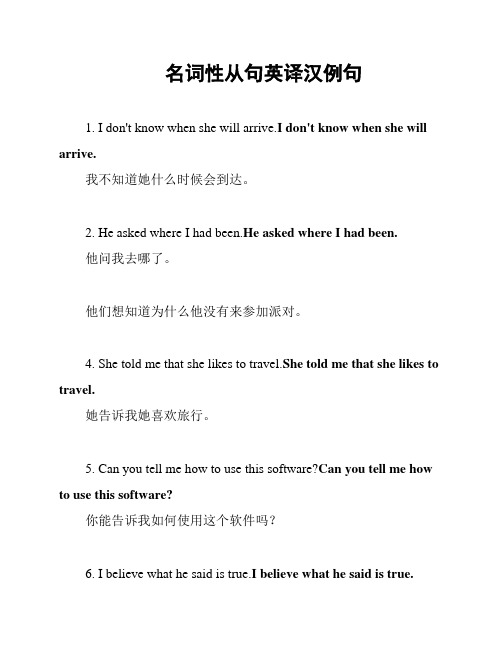
名词性从句英译汉例句1. I don't know when she will arrive.I don't know when she will arrive.我不知道她什么时候会到达。
2. He asked where I had been.He asked where I had been.他问我去哪了。
他们想知道为什么他没有来参加派对。
4. She told me that she likes to travel.She told me that she likes to travel.她告诉我她喜欢旅行。
5. Can you tell me how to use this software?Can you tell me how to use this software?你能告诉我如何使用这个软件吗?6. I believe what he said is true.I believe what he said is true.我相信他说的是真的。
你知道谁赢得了比赛吗?每个人了解他们的食物来自哪里是很重要的。
9. She wonders if it will rain tomorrow.She wonders if it will rain tomorrow.她想知道明天会不会下雨。
10. I can't remember what he said last night.I can't remember what he said last night.我记不得他昨天晚上说了什么。
11. He doesn't know why she left without saying goodbye.He doesn't know why she left without saying goodbye.他不知道她为什么没有告别就离开了。
12. The teacher asked who had finished the assignment.The teacher asked who had finished the assignment.老师问谁完成了任务。
名词性从句翻译

名词性从句翻译主语从句1、这个教材是否可用于我们的学校还未讨论过。
(whether)2、使我最感到吃惊的是他态度的突然转变。
(what)3、2010年世博会将在上海举行已成定局。
(that)所有国家都同意,绝不攻击带有红十字标记的任何物体。
(whatever)这次计划将如何执行仍需讨论。
(how)一本书是否畅销取决于诸多因素。
(Whether)(上海市高考题)以it为形式主语的主从复合句他看来不愿意对这件事作进一步的评论。
(seem)你喝了那么多咖啡难怪你睡不着。
(no wonder)据估计,飞到火星上来回一趟需要一年半多的时间。
(estimate) 他碰巧以前做过类似的练习。
(happen)他真的打算一路乘火车去莫斯科。
(true)一切物质都是原子构成的,这是众所周知的事实。
(fact)这种材料能否用在我们工厂还是一个问题。
(question)业已证明他们的建议在一定程度上是合理的。
(prove)原来他根本没出过国,也根本不是华侨。
(turn out)下一班火车什么时候去西藏通知了没有(announce)新产品销路好不好取决于它的质量。
(whether)据报道这种野生植物含有丰富的维生素。
(It)(上海市高考题)宾语从句汤姆希望成为任何一个能与他分享兴趣的人的朋友。
(whoever) 他们祖父当时也算是第一批就在这如今著名旅游胜地的地方安家的。
(what)除非下雨,这位老人每天都散步。
(except)我们问门卫办公室下午五点是否还开着。
(whether)我爸爸说我可以选任何一件看上去适合我的衣服。
(whichever) 我们应该仔细地取出任何可能对年轻人有害的东西。
(whatever)你能否告诉我为什么离开教室时不关灯(why)他除了喜欢偶尔下下棋外没多少别的爱好。
(except)以IT为形式并与的主从复合句不要想当然地认为所有问题通过一次讨论就能解决。
我们认为每个市民都讲礼貌是很重要的。
我们已把问题说清楚,吸烟对女性有更大的危害。
交大名词性从句翻译整理篇
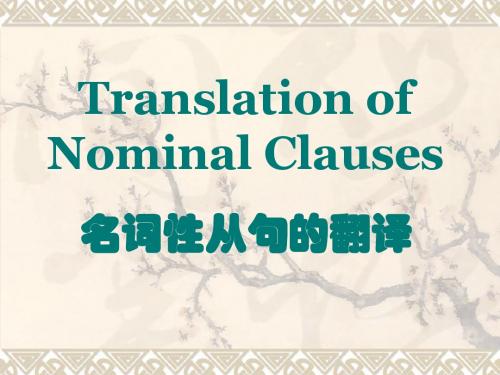
Continued
He
would never let the history books say of him that he had been content to sit on the sidelines, to be a gentle, leisurely president, letting events take their course. 他决不肯让将来的史书说他甘当一 个袖手旁观、温和懒散、听任事情 发展的总统。
One
difficulty is that almost all of what is called behavioral science continues to trace behavior to states of mind, feelings, traits of character, human nature, and so on. 难题之一在于所谓的行为科学 几乎全都依然从心态、情感、 性格特征、人性等方面去寻找 行为的根源。
2) 译为类似定语的结构或独立句
But
I knew I couldn’t trust him. There was the possibility that he was a political swindler. 但我知道不能轻信他。他是政治骗子这 种可能性还是存在的。 It does not alter the fact that he is the man responsible for the delay. 迟延应由他负责,这个事实是改变不了 的。
3) 加入冒号、破折号和 “这样”、“这一”、“即”等字眼
But
considering realistically, we had to face the fact that our prospects were less than good. 但在实事求是地考虑一番之后,我们不得不正 视这样一个事实:我们的前景并不妙。 Influenced by these ethics, the new generation live under the delusion that money does not stink. 受这种道德观念的影响,青年一代生活在这样 一种错觉中,以为金钱总是香喷喷的。
(完整版)名词性从句翻译练习

(完整版)名词性从句翻译练习名词性从句翻译练 (完整版)
名词性从句是指在句中充当名词的从句,它可以在句中充当主语、宾语、表语或同位语等成分。
以下是一些常见的名词性从句及其翻译练。
1. 主语从句
主语从句在句中作主语,用来引导一个完整的句子作为主语。
翻译时需要根据上下文和语境确定合适的译法。
例句:That she is late is a problem.
翻译:她迟到是个问题。
2. 宾语从句
宾语从句在句中作宾语,常跟在动词、形容词或介词后面。
翻译时要注意保持意思的连贯性。
例句:I don't know what she said.
翻译:我不知道她说了什么。
3. 表语从句
表语从句在句中充当表语,用来对主语进行补充说明。
翻译时
要保持句意的准确传达。
例句:His suggestion is that we should leave early.
翻译:他的建议是我们应该早点离开。
4. 同位语从句
同位语从句用来对名词进行解释说明,常跟在名词后面。
翻译
时要根据具体情况选择合适的表达方式。
例句:The fact that she passed the exam surprised everyone.
翻译:她通过考试的事实让每个人都感到惊讶。
以上是名词性从句的一些翻译练习,希望对你的学习有所帮助。
第五讲 名词性从句的翻译

第五讲名词性从句的翻译英语名词性从句包括主语从句、宾语从句、表语从句和同位语从句等,分别在复合句中充当主语、宾语、表语、和同位语。
(一)主语从句的译法I.“that + 从句的主语+ 从句的谓语+ 主句的谓语”、“It is + 形容词+ 从句”句型1.That the living conditions are improving is evident./ It is evident that the living conditions areimproving.生活条件在改善,这是很明显的。
/ 很明显,生活条件在改善。
2.It is important that the hotel receptionist make sure that guests are registered correctly.前台服务员应该确保每一位客人都登记无误,这点很重要。
/重要的是,前台服务员应该确保每一位客人都登记无误。
3.It’s probable that we will be a little late.我们很可能要迟到一会儿。
4.It was really astonishing that she refused to talk to her parents.令人吃惊的是,她竟然拒绝和父母谈话。
(常用于“It is + 形容词+ that 从句”结构的形容词有“clear, important, possible, strange, necessary, essential”等。
翻译时,先将that 后的主语从句翻译出来,然后加上“(这是)很+ 形容词”的结构。
但有时将形容词转换成副词短语,会使译文更符合汉语的表达习惯。
II.” It is + 名词+ that从句”句型: 翻译这类结构时,通常也会涉及“词类转换”和“语序调整”等翻译技巧。
常用于此结构的名词词组有“a fact, a pleasure, a pity, a pleasant thing, one’s duty, an hour, a shame, no easy job, good news, a waste of time”等例:1.That the climate around the world is changing is an accepted fact./ It is an accepted fac t that the climate around the world is changing.世界各地的气候都在变化,这是人所共知的事实。
4种名词性从句的翻译方法

• In July 1898, Curie and her husband got a great success that they discovered the radioactive element—polonium.
• 你来不来我不在乎。
• It seemed incredible that she should have lied to us. • 她居然对我们说谎,这真是不可思议。
• It is strange that she should have failed to see her own shortcomings.
works.【主谓结构作定语】
这是关于这台新型电气仪表如何运作的说明。
2024/8/8
12
同位语从句
常用连词that或链接副词来 引导,用以对某个名词作进 一步的解释或说明。翻译时 也可采取不同的方法。
2024/8/8
13
• 方法一:把同位语从句译成汉语联合复句中的一个分句。
• It was from these slender indications of scholarship that Dr. Weldon drew the conclusion that I was worthy to pass into Harrow.
绕着人工湖跑步的一个好处,就是不能抄近路回家。
The fact is that electronic computer are of great benefit to the development of science and technology.【主谓结构】 事实是电子计算机十分有利于科学技术的发展。
名词性从句翻译

2. 宾语从句
EX 5: I made it clear to them that they must hand in their papers before 10 o’clock in the morning. 译文: EX 6: I leave it to your own judgment whether you EX 5: 我向他们讲清楚了的,他们必须在上午十时前 should do it. 交卷。 EX 7: I 我让你自己判断,这件事该不该做。out to EX 6: think it quite true that he ventured Shangri-la. EX 7: 他又冒险去香格里拉了,我觉得这件事千真万 确。 EX 8: What they were asked to do in 10 days, they EX 8: 让他们十天做的事,他们两天就做完了。 finished in two.
4C加入冒号、破折号和“这样”、 “这一”、“即”等
EX9:But considering realistically, we had to face the 译文: fact that our prospects were less than good.(许建 EX9:但在实事求是地考虑一番之后,我们不得不正 平,2008V2:136 ) 视这样的事实:我们的前景并不妙。(许建平,2008V2:136 ) EX10:We have reached the conclusion that practice EX10:我们已经得出这样的结论:实践是检验真理 is 的标准。 the criterion for testing truth.
1. 主语从句
EX5: It is frequently the case that his car breaks down on the highway. 译文: EX6: It is frequently said that computers solve EX5:他的车在路上抛锚,这是常有的事儿。 problems only because they are “programmed” to do EX6: 人们常说,电脑之所以能解决问题,知识只是 so. (许建平,2008V2:134) 因为它们给输入了解决问题的“程序”。 EX7: It doesn’t make much diffeence whether he EX7: 他参不参加会议都没多大关系。 EX8: 她很担忧,她女儿竟然很晚都不睡觉。 attends the meeting or not. (同上) EX8: It worried her much that her daughter shoulLeabharlann stay up so late.
名词性从句的翻译
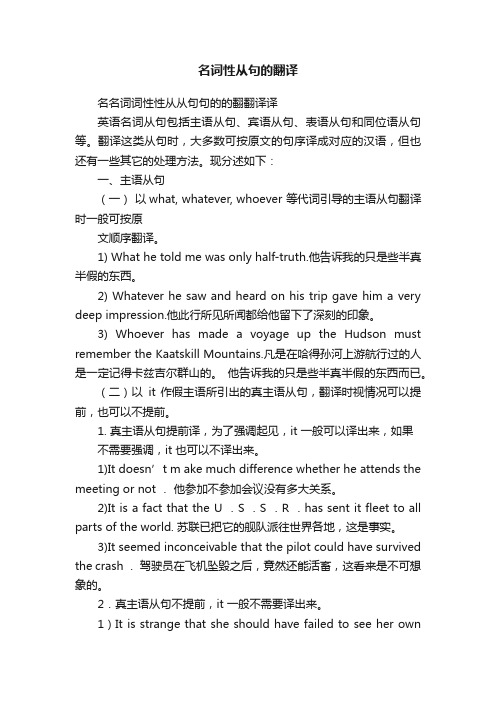
名词性从句的翻译名名词词性性从从句句的的翻翻译译英语名词从句包括主语从句、宾语从句、表语从句和同位语从句等。
翻译这类从句时,大多数可按原文的句序译成对应的汉语,但也还有一些其它的处理方法。
现分述如下:一、主语从句(一)以what, whatever, whoever 等代词引导的主语从句翻译时一般可按原文顺序翻译。
1) What he told me was only half-truth.他告诉我的只是些半真半假的东西。
2) Whatever he saw and heard on his trip gave him a very deep impression.他此行所见所闻都给他留下了深刻的印象。
3) Whoever has made a voyage up the Hudson must remember the Kaatskill Mountains.凡是在哈得孙河上游航行过的人是一定记得卡兹吉尔群山的。
他告诉我的只是些半真半假的东西而已。
(二)以it 作假主语所引出的真主语从句,翻译时视情况可以提前,也可以不提前。
1. 真主语从句提前译,为了强调起见,it 一般可以译出来,如果不需要强调,it 也可以不译出来。
1)It doesn’t m ake much difference whether he attends the meeting or not .他参加不参加会议没有多大关系。
2)It is a fact that the U .S .S .R .has sent it fleet to all parts of the world. 苏联已把它的舰队派往世界各地,这是事实。
3)It seemed inconceivable that the pilot could have survived the crash .驾驶员在飞机坠毁之后,竟然还能活畜,这看来是不可想象的。
2.真主语从句不提前,it 一般不需要译出来。
名词性从句翻译

decide whether you should go to collage or take a job.
5.以上所概括的要点证明了考试并不仅仅给我们提供分数。(more than)
The outlined important points prove that tests do more than just provide us with grades.
19.请再检查一遍,确保没有任何细节被忽略了。(overlook)
Please check it again and/to make sure that no details have been overlooked.
20.老师对学生们把注意力放在如何提高英语口语上感到
满意。(focus on)
The teacher felt satisfied that the students had focused their attention on how to improve their spoken English. 表语从句:
10.研究表明这新药是否对这病人有效还是一个问题。(remain)
The research indicates that it remains a question whether the new medicine will have any effect on the patient. 11.学生们逐渐认识到友谊胜
14.你该为刚才的所作所为向在场的人道歉。(apologize) You should apologize to the people present for what you have just done.
什么是名词性从句
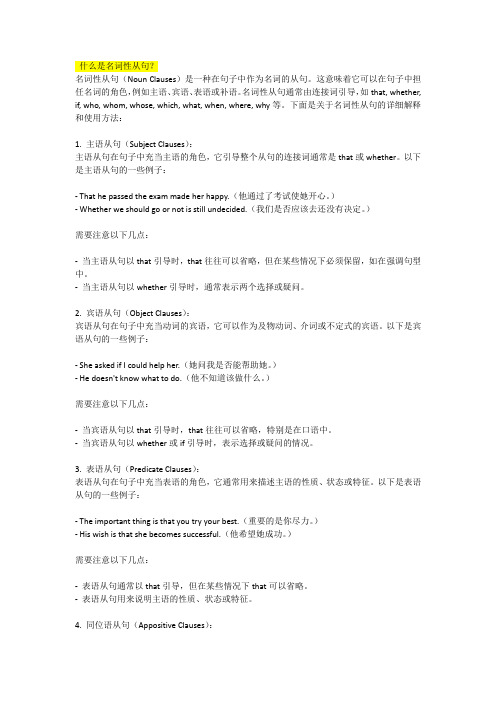
什么是名词性从句?名词性从句(Noun Clauses)是一种在句子中作为名词的从句。
这意味着它可以在句子中担任名词的角色,例如主语、宾语、表语或补语。
名词性从句通常由连接词引导,如that, whether, if, who, whom, whose, which, what, when, where, why等。
下面是关于名词性从句的详细解释和使用方法:1. 主语从句(Subject Clauses):主语从句在句子中充当主语的角色,它引导整个从句的连接词通常是that或whether。
以下是主语从句的一些例子:- That he passed the exam made her happy.(他通过了考试使她开心。
)- Whether we should go or not is still undecided.(我们是否应该去还没有决定。
)需要注意以下几点:-当主语从句以that引导时,that往往可以省略,但在某些情况下必须保留,如在强调句型中。
-当主语从句以whether引导时,通常表示两个选择或疑问。
2. 宾语从句(Object Clauses):宾语从句在句子中充当动词的宾语,它可以作为及物动词、介词或不定式的宾语。
以下是宾语从句的一些例子:- She asked if I could help her.(她问我是否能帮助她。
)- He doesn't know what to do.(他不知道该做什么。
)需要注意以下几点:-当宾语从句以that引导时,that往往可以省略,特别是在口语中。
-当宾语从句以whether或if引导时,表示选择或疑问的情况。
3. 表语从句(Predicate Clauses):表语从句在句子中充当表语的角色,它通常用来描述主语的性质、状态或特征。
以下是表语从句的一些例子:- The important thing is that you try your best.(重要的是你尽力。
- 1、下载文档前请自行甄别文档内容的完整性,平台不提供额外的编辑、内容补充、找答案等附加服务。
- 2、"仅部分预览"的文档,不可在线预览部分如存在完整性等问题,可反馈申请退款(可完整预览的文档不适用该条件!)。
- 3、如文档侵犯您的权益,请联系客服反馈,我们会尽快为您处理(人工客服工作时间:9:00-18:30)。
主语从句1、这个教材是否可用于我们的学校还未讨论过。
(whether)2、使我最感到吃惊的是他态度的突然转变。
(what)3、2010年世博会将在上海举行已成定局。
(that)4、所有国家都同意,绝不攻击带有红十字标记的任何物体。
(whatever)5、这次计划将如何执行仍需讨论。
(how)6、一本书是否畅销取决于诸多因素。
(Whether)(上海市高考题)以it为形式主语的主从复合句1、他看来不愿意对这件事作进一步的评论。
(seem)2、你喝了那么多咖啡难怪你睡不着。
(no wonder)3、据估计,飞到火星上来回一趟需要一年半多的时间。
(estimate)4、他碰巧以前做过类似的练习。
(happen)5、他真的打算一路乘火车去莫斯科。
(true)6、一切物质都是原子构成的,这是众所周知的事实。
(fact)7、这种材料能否用在我们工厂还是一个问题。
(question)8、业已证明他们的建议在一定程度上是合理的。
(prove)9、原来他根本没出过国,也根本不是华侨。
(turn out)10、下一班火车什么时候去西藏通知了没有(announce)11、新产品销路好不好取决于它的质量。
(whether)12、据报道这种野生植物含有丰富的维生素。
(It)(上海市高考题)宾语从句1、汤姆希望成为任何一个能与他分享兴趣的人的朋友。
(whoever)2、他们祖父当时也算是第一批就在这如今着名旅游胜地的地方安家的。
(what)3、除非下雨,这位老人每天都散步。
(except)4、我们问门卫办公室下午五点是否还开着。
(whether)5、我爸爸说我可以选任何一件看上去适合我的衣服。
(whichever)6、我们应该仔细地取出任何可能对年轻人有害的东西。
(whatever)7、你能否告诉我为什么离开教室时不关灯(why)8、他除了喜欢偶尔下下棋外没多少别的爱好。
(except)以IT为形式并与的主从复合句1、不要想当然地认为所有问题通过一次讨论就能解决。
2、我们认为每个市民都讲礼貌是很重要的。
3、我们已把问题说清楚,吸烟对女性有更大的危害。
4、我会负责地让一切都按照事先安排好的那样进行。
what引导的名词性从句1、你该就刚才的所作所为向在场的人道歉。
2、使市民高兴的是,苏州河不再是几年前的样子了。
3、过了一会儿我们大家才开始觉察到发生了什么事。
4、抽出一点时间复习白天你所学的东西是非常必要的。
5、女儿全神贯注地看卡通,没有听见我对她说的话。
6、他首先想到的是国家的利益而不是他的荣誉。
7、这个男孩的言行不一。
8、美国的独立精神正是使汽车流行的原因。
Keys:主语从句这个教材是否可用于我们的学校还未讨论过。
(whether)Whether the teaching materials can be used in our school hasn’t been discussed. It hasn’t been discussed …使我最感到吃惊的是他态度的突然转变。
(what)What surprised me most was the sudden change of his attitude.2010年世博会将在上海举行已成定局。
(that)That the 2010 Expo will be held in Shanghai has already been decided.It has been decided that the 2010 Expo will be….所有国家都同意,绝不攻击带有红十字标记的任何物体。
(whatever)All the countries have agreed that whatever bears the Red Cross must never be attacked.这次计划将如何执行仍需讨论。
(how)How the program / plan is to be carried out needs discussing / to be discussed.一本书是否畅销取决于诸多因素。
(Whether)(上海市高考题)Whether a book sells well depends on many / various factors以it为形式主语的主从复合句1.It seems that he is not willing to make a further c comment on it/ He seems not to be willing to make a further comment on it.2.It's no wonder that you can't go to sleep since you have drunk so much coffee.3.It is estimated that a round-trip flight to Mars would take more than a yearand a half.4.It so happened that he had done the similar exercises before./ He happened to have done the similar exercises before.5.It is true that he is going to take the train all the way to Moscow.6.It is a well-known fact that all matter is made up of atoms.7.It is still a question whether this material can be used in our factory.8.It has been proved that their suggestion is reasonable to a certain degree.9.It turned out that he had never been abroad and was not an overseas Chineseat all.10.Has it been announced when the next train leaves for Tibet11.It depends on its quality whether a new product sell well./ Whether a new product sells well depends on its quality.12.It is reported / said that this wild plant is rich in / contains / has a lotof vitamins.宾语从句1.Tom hopes to become a friend of whoever shares his interests./ Tom hopes that he can become a friend of whoever shares his interests./ Tom hopes to become a friend of somebody who can share / shares hisinterests.2.His grandfather was among the first to settle in what is now a famous touristattraction.3.The old man takes a walk every morning except when it rains./ The old man takes a walk every morning unless it rains.4.We asked the doorman whether the office would still be open at 5 pm.5.My father says that I can choose whichever dress looks nice to me.6.We should carefully remove '/ get rid of whatever might be harmful to youngpeople / youngsters.7.Can you tell me why you didn't turn off the light when you left the classroom8.He doesn't have other hobbies except that he plays chess occasionally.以IT为形式并与的主从复合句1.Don't take it for granted that all the problems can be solved through adiscussion.2.We think it very important that every citizen should have good manners.3.We have made it clear that smoking does more harm to females.4.I will see to it that everything is carried out as planned.what引导的名词性从句1.You should apologize to the people present for what you have just done.2.To the delight of the citizens, the Suzhou River is no longer what it usedto be years ago.3.After a while, all of us began to be ware of what had happened.4.It's necessary to set aside some time to review what you have learnt in theday.5.My daughter was absorbed in her cartoon so that she didn't hear what I wassaying to her.6.What he thought about first was the interest of his country instead of hishonor.7.What the boy does is often contrary to what he says./ The boy's words are contrary to his deeds.8.The American spirit of independence is what has really made the cars popular.。
